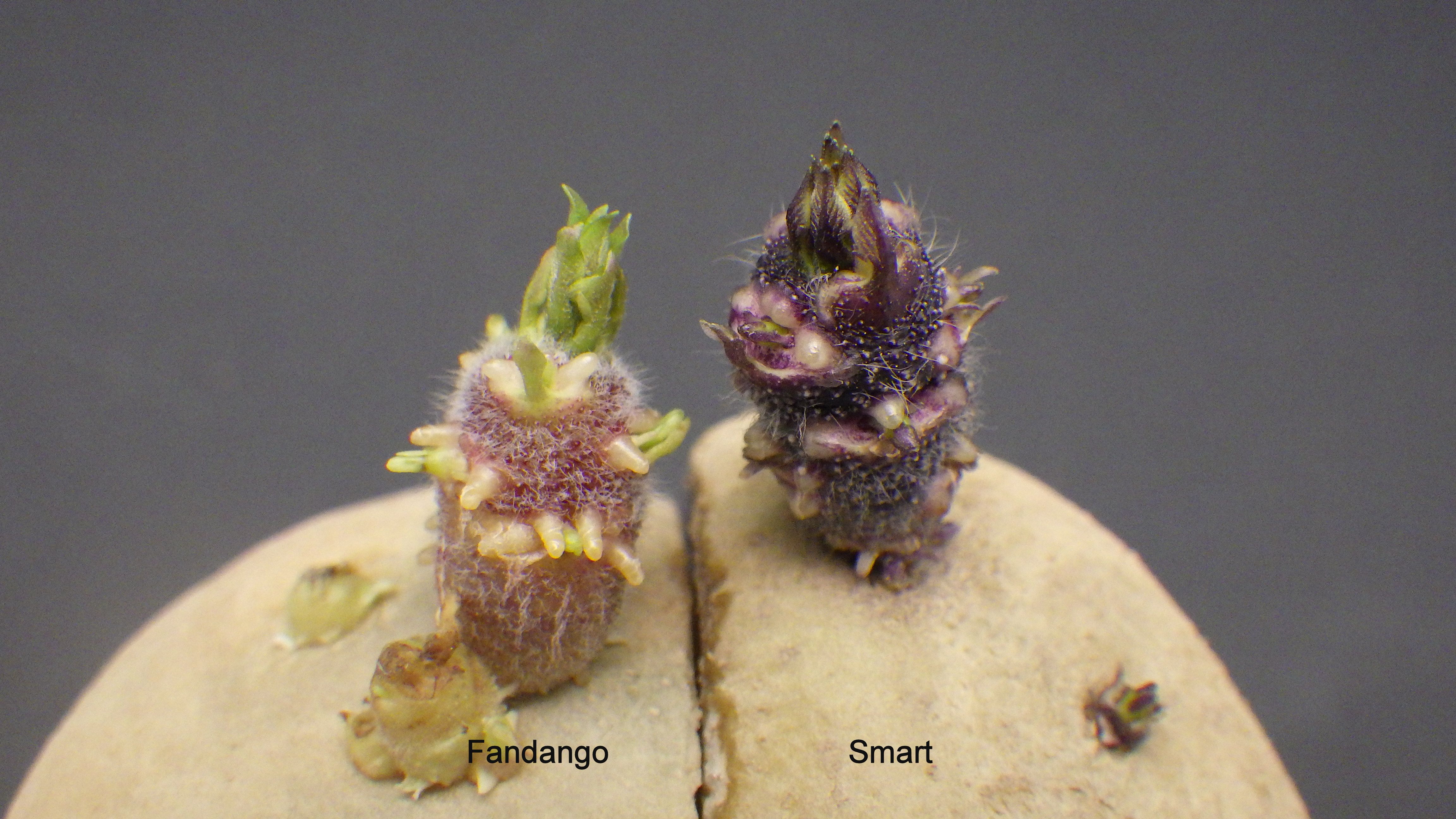Fandango
| Denomination: | 'Fandango' |
|---|---|
| Botanical Name: | Solanum tuberosum |
| Applicant/Holder: |
IPM Potato Group Limited Unit 412, Q House 76 Furze Road, Sandyford Industrial Estate Dublin D18 Ireland |
| Breeder: |
Denis Griffin, Teagasc, Carlow, Ireland |
| Agent in Canada: |
Global Agri Services Inc. 376 New Maryland Highway New Maryland, New Brunswick E3C 1E5 Canada Tel: 506-462-9493 |
| Application Date: | 2016-07-05 |
| Provisional Protection:: | 2016-07-05 |
| Application Number: | 16-8965 |
| Grant of Rights Date: | 2019-01-10 |
| Certificate Number: | 5894 |
| Exemption from compulsory licensing: | Yes |
| Expiry date for exemption from compulsory licensing: | 2021-01-10 |
| Grant of Rights Termination Date: | 2039-01-10 |
Variety Description
Variety used for comparison: 'Smart'
Summary: The base of the lightsprout of 'Fandango' has medium to strong intensity of anthocyanin colouration with an absent or very low proportion of blue whereas the base of the lightsprout of 'Smart' has very strong intensity of anthocyanin colouration with a high proportion of blue. The tip of the lightsprout of 'Fandango' has very weak intensity of anthocyanin colouration whereas the tip of the lightsprout of 'Smart' has strong intensity of anthocyanin colouration. The plants of 'Fandango' mature late to very late whereas the plants of 'Smart' mature mid-season. The plants of 'Fandango' are taller than the plants of 'Smart'. The presence of secondary leaflets of the leaf is strong for 'Fandango' whereas the presence is weak to medium for 'Smart'. The frequency of coalescence of the terminal and lateral leaflets is absent or very low for 'Fandango' whereas the frequency is low for 'Smart'. The depth of the veins of the leaflet is deep for 'Fandango' whereas the depth is shallow to medium for 'Smart'. At the apical rosette, the leaflet blade of 'Fandango' is glabrous whereas the leaflet blade of 'Smart' is pubescent. The frequency of inflorescences per plant is high for 'Fandango' whereas the frequency is low to medium for 'Smart'. The corolla of 'Fandango' is large whereas the corolla of 'Smart' is medium size. In reaction to light, the tuber skin of 'Fandango' develops weak to medium intensity of anthocyanin colouration whereas the tuber of 'Smart' develops very weak intensity of anthocyanin colouration.
Description:
LIGHTSPROUT: medium to large, broad cylindrical shape, medium number of root tips, short lateral shoots
LIGHTSPROUT BASE: medium to strong intensity of anthocyanin colouration, absent or low proportion of blue in anthocyanin colouration, medium to dense pubescence
LIGHTSPROUT TIP: small in relation to base, closed habit, very weak intensity of anthocyanin colouration, sparse to medium density of pubescence
PLANT: foliage structure is stem to intermediate type where foliage is half open to open and stems are partly to clearly visible, semi-upright to spreading growth habit, late to very late maturity
STEM: medium extent of anthocyanin colouration along entire stem
LEAF: medium to large outline, intermediate to open, medium to dark green upper side, absent or very low extent and absent or very weak intensity of anthocyanin colouration of upper side of midrib, strong presence of secondary leaflets, absent or very low frequency of coalescence of terminal and lateral leaflets
SECOND PAIR OF LATERAL LEAFLETS: leaflet is medium to large and narrower than long
LEAFLET: weak waviness of margin, deep veins, medium degree of glossiness of upper side, glabrous blade at apical rosette
INFLORESCENCE: high frequency per plant, small to medium size
PEDUNCLE: low extent of anthocyanin colouration
FLOWER BUD: low extent of anthocyanin colouration
COROLLA: large
COROLLA (INNER SIDE): absent or very low extent of anthocyanin colouration, absent or very weak intensity of anthocyanin colouration, absent or low proportion of blue in anthocyanin colouration
TUBER: round shape, light yellow flesh
TUBER EYE: shallow, yellow at base
TUBER SKIN: yellow, develops weak to medium intensity of anthocyanin colouration in reaction to light
Origin & Breeding History: 'Fandango' (experimental designation T3039/38) originated from a cross between the variety 'Famosa', as the female parent, and the variety 'Cara', as the male parent, conducted in 1997, at the Teagasc Breeding Station in Carlow, Ireland. From the resulting progeny, 'Fandango' was selected in 1999 based on negative mass selection for agronomic characteristics and disease resistances.
Tests & Trials: The comparative test and trial for 'Fandango' was conducted by Global Agri Services Inc. during the growing season of 2017 in Drummond, New Brunswick. There were 70 plants each of the candidate and reference variety. The trial consisted of a single, 21.2 metre long row with plants spaced 0.3 metres apart for each variety. The distance between rows within the trial was 0.9 metres. The observations and measurements were taken from 10 plants, or 10 parts of plants, of each variety. The mean difference was significant at the 5% probability level based on a paired Student's t-test.
Comparison table for 'Fandango' with reference variety 'Smart'
Plant height (cm)
| 'Fandango' | 'Smart' | |
|---|---|---|
| mean | 78.1 | 58.4 |
| std. deviation | 2.5 | 2.0 |
Click on image for larger view

Potato: 'Fandango' (left) with reference variety 'Smart' (right)
- Date modified: